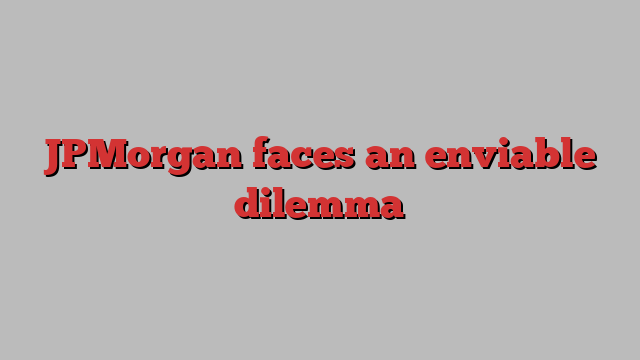
Unlock the Editor’s Digest for free
Roula Khalaf, Editor of the FT, selects her favourite stories in this weekly newsletter.
Beyoncé’s “Crazy In Love” was the walk-on music of choice for JPMorgan Chase executives at this year’s investor day. A more fitting number might have been Amy Winehouse’s “Rehab”.
Its chorus — “but I said, no, no, no” — pretty much summed up boss Jamie Dimon’s response to repeated analyst questions about whether it would plough more of the bank’s excess capital into share buybacks.
JPMorgan, the country’s biggest and most profitable bank, is in an enviable position. The company’s common equity tier one capital ratio stood at 15 per cent at the end of the first quarter, up from 13.8 per cent a year earlier and well above its regulatory minimum. This translates into a buffer of about $54bn, a figure that is expected to swell to $78bn by the end of the first quarter next year, according to its own estimate. Analysts at Morgan Stanley reckon the number could hit $90bn if proposals to increase bank capital (dubbed the “Basel endgame”) end up being watered down.
Yet Dimon has categorically shot down the idea of increasing buybacks beyond the $2bn per quarter already planned. Not when the stock, which hit a new record high this month, is trading in excess of two times tangible book value.
Dimon is right to be cautious. The party continues to rage in the $10tn US corporate bond market, with credit spreads approaching their lowest levels in almost two decades. But America’s increasingly stretched consumers are telling another story. Loan growth outside of credit cards has stalled across the country’s largest retail banks. Companies from McDonald’s to Starbucks are fighting to hang on to customers. At JPMorgan, net charge-offs on credit card loans are expected to increase to 3.4 per cent this year before rising to 3.6 per cent in 2025. That compares with a rate of 3.1 per cent in 2019.
Once you become as big as JPMorgan, it is also hard to find something that will move the dial. The bank made nearly $50bn in net profit last year and posted a return on tangible common equity of 21 per cent. Within this, the massive consumer and community business accounted for nearly 43 per cent of group net income. The chance to buy another bank like First Republic is unlikely given the regulatory environment.
Still, Dimon, who surprised investors by indicating that he could step down within five years, batted away suggestions he should hand out the bank’s war chest: “It’s earnings in store. It doesn’t go away. You haven’t given up on a future opportunity by letting it sit there.”
He has little to lose by sitting on JPMorgan’s excess capital for now.